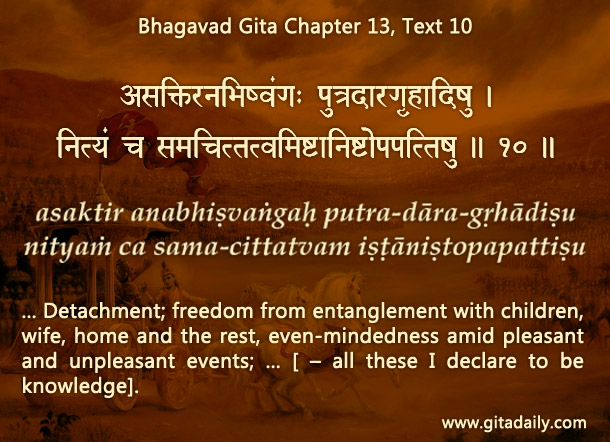In the Bhagavad-gita’s thirteenth chapter, Krishna lists twenty characteristics of those in knowledge. And one characteristic is detachment, specifically detachment from children, wife, home and the like (13.10). Similar lists of things to be detached from can be found in other Vedic literature such Srimad-Bhagavatam, yet those lists usually place wife before children (6.11.27). Why might Krishna have listed children before wife? Possibly because he knew that Arjuna’s detachment from his sons would soon be tested when the upcoming Kurukshetra war would martyr his sons?
Moving on from that intriguing thought, consider how Krishna responded to Arjuna’s breakdown on the death of his son, Abhimanyu. The Mahabharata devotes nearly an entire chapter to describe Arjuna’s agony, his sense of personal failure and even his anger at all those who failed to protect Abhimanyu, including his brothers. Does Krishna chide a lamenting Arjuna: “Have you already forgotten my Gita teachings: I had specifically mentioned detachment from sons?”
Far from chastising Arjuna, Krishna focuses on consoling him. Essentially, he says, “Adversity comes upon everyone in this world, both the wise and the unwise. The difference is that the wise act in a way that decreases the distress, whereas the unwise act in ways that increase it. Arjuna, just look at your brothers: they too are afflicted by Abhimanyu’s death. Don’t speak words that will increase their affliction.”
Krishna taught Arjuna that distress needs to be tolerated (02.13). But when distress befell Arjuna, Krishna didn’t harp that Arjuna was not tolerating; instead, Krishna helped Arjuna in tolerating — not so much by quoting philosophy as by embodying that philosophy in a compassionate way.
One-sentence summary:
When a philosophically informed person reacts to distress emotionally instead of philosophically, don’t chide them for not living the philosophy; help them in living it by yourself embodying the philosophy humanely.
Think it over:
- What is significant about Krishna’s description of detachment in the Gita’s thirteenth chapter?
- How does Krishna respond to Arjuna’s emotional breakdown after Abhimanyu’s death?
- What can you learn from Krishna about applying his teachings?
***
13.10 … Detachment; freedom from entanglement with children, wife, home and the rest, even-mindedness amid pleasant and unpleasant events; … [ – all these I declare to be knowledge].
To know more about this verse, please click on the image


Leave A Comment